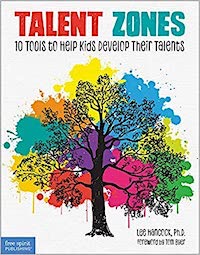10 Tools to Help Kids Develop Their Talents
Talent Zones: 10 Tools to Help Kids Develop Their Talents
By Lee Hancock, Ph.D.
(Free Spirit Publishing, 2022 – Learn more)
Reviewed by Virginia Hornberger
The dream to be the next Michael Jordan, Dav Pilkey, Maya Angelou or Taylor Swift lives in the heart of every young child. Realistically, each person does not have this high level of talent in a specific area. But does that mean a person is not talented enough to be successful?
How many adults still search for that one, unique, special ability that will make us stand out among our peers?
In the book Talent Zones: 10 Tools to Help Kids Develop Their Talents, Dr. Lee Hancock provides thoughtful, relatable, and interesting insights and demonstrates that a supportive environment and deep practice provide the opportunity for all children to develop talent.
Understanding talent

The second part of Talent Zones shares 10 strategies called talent development zones that we can use when developing talent in all children.
Each zone is equally important:
- Embrace failure as an opportunity
- Smash ceilings
- Provide opportunities for deep, deliberate practice
- Build realistic optimism
- Foster in kids a love for their own endeavors
- Develop and inspire creativity
- Build “I can” kids
- Help kids manage pressure
- Develop persistence (and know when to change course)
- Create a culture of development
Taking Talent Zones to class
Each chapter provides a scenario or background information that defines the relevance of the zone and the fundamental belief behind it. Research supports each point made in the chapter.
Hancock clearly explains how each talent zone applies to the classroom or sporting context. He shares the important mindset teachers and coaches need to use with children. Finally, each chapter ends with a “To-Do List” section that transforms the research into easy-to-implement strategies.
In a time when social-emotional skills beckon for attention in the classroom, in sports arenas, and at home, a sense that each person has special abilities must be a reality. Children struggle to locate their sense of uniqueness and areas where they can shine. It’s up to adulst to take a “Talent Zone approach” and create an environment and mindset that allows each and every child to discover their talent.
Talent Zones: 10 Tools to Help Kids Develop Their Talents provides a new perspective on developing talent and a growing a healthy frame of mind in children that leads to confidence and success. It is paramount that teachers, coaches, parents, and anyone else that works closely with children read this book. In fact, adults may gain new insights that can help them develop their own talent zones.
Virginia Hornberger became an assistant principal at Muhlenberg (PA) Elementary Center in 2020. She has spent the majority of her educational career in the Muhlenberg School District in various capacities. Her educational achievements include earning a Masters of Language and Literacy from Millersville University and a Masters of Educational Technology from Wilkes University.
Virginia also holds a reading specialist certification. She enjoys reading professional literature, nonfiction novels, and children’s literature. Her days spent with her three children, Elizabeth, JeanLouise, and Thomas (and her dog, Frankie) make her the happiest.































As a parent, I frequently think about my kids’ talents and how I can help them grow. The belief that each child has a special talent waiting to be uncovered is very comforting to me. And the method of simplifying talent development into actionable steps feels like a breath of fresh air. I’ll definitely be adding it to my reading list!